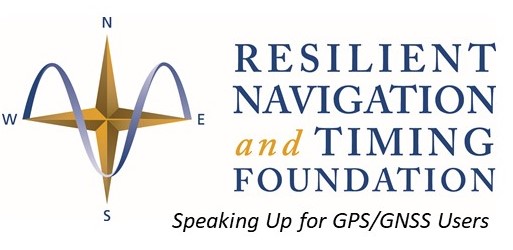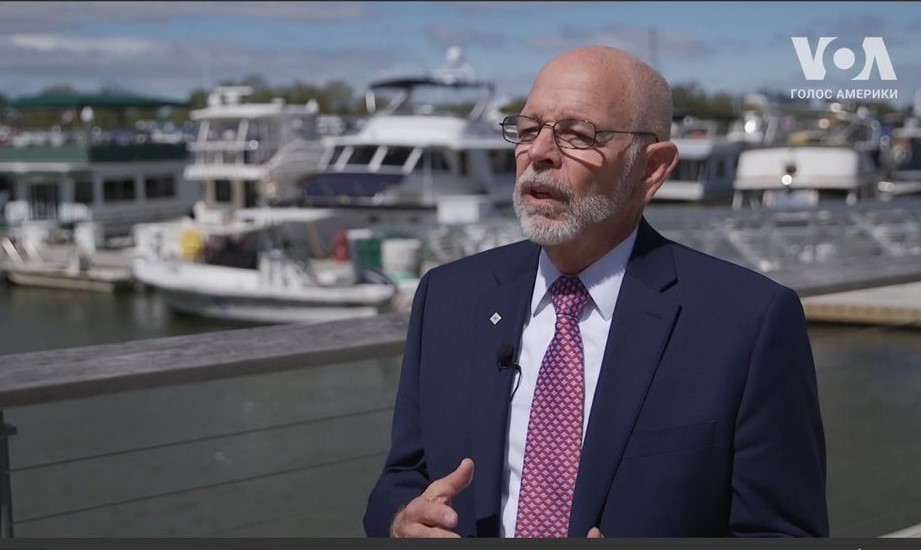Image: RNT Foundation President Speaking to VOA Ukraine
Blog Editor’s Note: RNTF President Dana A. Goward was the moderator for Defense Strategies Institute’s second annual Assured PNT Summit last week at National Harbor near Washington, D.C. Here are his opening remarks.

GPS & PNT in a Great Power Struggle World
It was Thursday the 9th of November 1989. The Chairman of the East German Communist Party declared that citizens were free to cross into west Germany. The Berlin Wall fell. Other eastern European governments had been loosening the reins for months. But the practical and symbolic implications of the Berlin Wall coming down rang around the world. The Cold War was over.
Over the next decade the west breathed a collective sigh of relief. The Soviets were history and big danger was gone.
Francis Fukuyama’s book “The End of History” summed it up. Liberal democracies and market based economies would naturally and automatically spread across the planet. China was rising, but they had so many problems of their own, and they seemed to put their economic interests first. The world would be so economically interconnected no country would want to engage in another major war.
Then it became clear that there were some places that did not have that great an opinion of western democracy and markets. Tribalism and religious fundamentalism was more their style. Well OK, some messy corners of the planet to deal with, but at least we were beyond major conflicts between great powers.
But then, the defeating tribalism and nationalism and fundamentalism didn’t go so well. Democracy didn’t spring to life automatically once Saddam Hussein was removed. Afghanistan was the same stubborn quagmire for the U.S. as it was for the Soviets.
Even our friends the British began showing some national tribalism and left the European Union.
And at home “America First” was one of the rallying cries of a successful Presidential candidate.
Slowly, slowly, slowly, many folks began to realize that history was not dead.
For those few who still clung fast to the illusion that the world had moved on from the Great Power struggle years of WWII and the Cold War, Russia’s invasion of Ukraine in February slammed the door.
We are sill in a world of great power competition. A world of democracies desperately fighting for survival in the face of rapacious autocracies.
How does all of this apply to us here at Defense Strategies Institute’s Assured PNT Summit?
Russia in February reminded us of the true state of the world and the class between freedom and servitude was still on-going.
Russia also reminded us that positioning, navigation, and timing was a key component of that struggle.
As Russian troops massed its troops on its border with Ukraine in November, a missile streaked toward space from somewhere deep within the nation. When it rose above the atmosphere it released a kill vehicle that went on to destroy a retired satellite. An enormous debris field was created that endangered the International Space Station with two Russian cosmonauts aboard.
Russia was making a statement to the west. “We are powerful. We know you rely heavily on space. We are willing to do what it takes to counter you, even if we might have to suffer some loss at the same time.”
If the message was not clear enough, a week later Russian state TV boasted that the nation could shoot down all 32 GPS satellites and blind NATO.
Whether or not they have the capability at this moment is irrelevant. If they don’t they will, and they certainly have enough EW capability to deny GPS over huge areas.
And not to be outdone, China has added to the conversation. In January a Chinese satellite grappled another satellite and chucked it out of orbit. A great message there. “We are a powerful presence in space. And more capable and sophisticated than Russia. We can get rid of your satellites with no debris, no fuss, no muss.”
In December the White House acknowledged Russia’s threat to GPS. A member of the National Security Council told an advisory board that “GPS is still a single point of failure” for the nation. So the administration is concerned. And well it should be.
They are certainly concerned in an absolute sense about the near-existential impacts of a major GPS disruption upon the nation. But they are also concerned, I am sure, that our major adversaries China and Russia, are not nearly as dependent on space-based PNT as we are.
China has a comprehensive PNT architecture that includes satellites at GEO, MEO, and LEO, extensive and precisely measured fiber networks able to transfer highly precise time, plans to use 5G infrastructure for PNT, and a national eLoran network specifically deployed to protect the nation from interruptions of space-based signals.
Russia’s architecture, while less extensive than China’s, includes a Loran-like system that serves the most developed parts of the nation. And, because its armed forces’ doctrine assumes that signals from space will be denied during any major conflict, Russia’s armed forces seem to have a mobile terrestrial PNT system for expeditionary operations.
So where does this leave the United States? Clearly in PNT we are at best, in third place. Domestically and militarily, PNT, a fundamental piece of tech infrastructure, is vulnerable. And unlike our major adversaries, we have no widely deployed fallbacks should GPS/GNSS be denied.
That is why we are here. To find out what the government and industry are doing about the problem, and how we can all work together to protect America.


